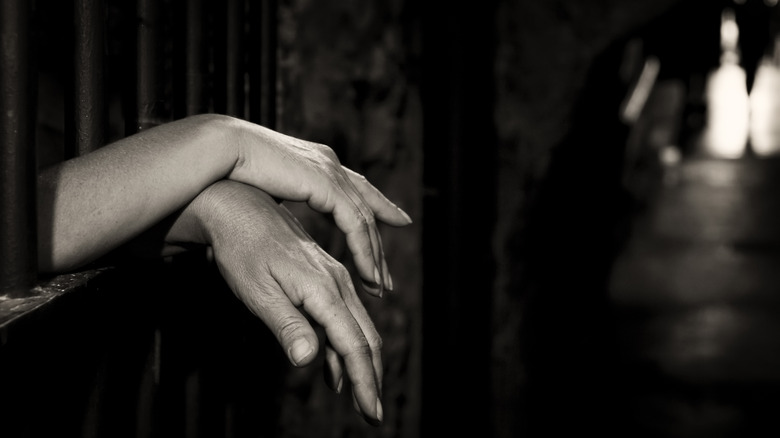Expert Speculates On Elizabeth Holmes' Life In Prison (And Predicts Her Biggest Wakeup Call)
Now that former Theranos CEO and founder Elizabeth Holmes has been tried and sentenced to 11 years in prison for defrauding investors about her company's one-prick-tests-all blood analyzer machine, many folks have been left wondering what her life in prison will look like. She tried to use the birth of her two children — born in 2021 and 2023 as her trial commenced and progressed — to delay receiving her sentence, as CBS News describes. She also intended to flee the country, prosecutors claim, via a one-way ticket to Mexico that got canceled after authorities discovered the purchase. Meanwhile, she paid $13,000 a month to live on an estate while her appeal was being processed. In other words, she's not exactly the kind of person who would take too well to life behind bars.
But what exactly would that life look like? In the words of former inmate Lynn Espejo via News Nation, "not that bad." Holmes will live out her sentence in Federal Prison Camp Bryan in Texas, a minimum security facility housing about 650 inmates. It's got "moldy showers, low-quality food, and leaky ceilings," and bedding "like a kindergarten mat," Espejo says. But "the women are nice" and there's "a lot of free movement." Justin Paperny, however — Director of White Collar Advice – told Grunge in an exclusive interview that it's not all sunshine and roses in Bryan Federal Prison. There's work, education, exercise, and most difficult of all: almost too much free time.
Adjustment to prison life
In his exclusive interview with Grunge, Director of White Collar Advice Justin Paperny described precisely the life that Elizabeth Holmes will face while serving out her 11-year sentence at Bryan Federal Prison. To start, he was quick to point out that life across all prison camps is intended to be uniform. The experience at one camp is the same as another, and despite rumors to the contrary, there's no such thing as a "superior" camp that's nicer or allows for an easier life. There are strict rules and regulations, and if Holmes is looking to complete her sentence with minimal trouble, she'll have to follow procedures and treat the entire time as preparation for her eventual release. Further specifics can be found on the Bryan Prison Camp website, including an inmate Admissions and Orientation Handbook, a list of items sold at the camp's commissary, a breakdown of legal materials available to reference, and more.
Daily life at Bryan Prison Camp, Paperny told Grunge, will "prioritize physical exercise" through running or sports like tennis. There will be "approved educational programs" — like foreign languages and "business skills" per the BBC — and hourly work often related to custodial or food service tasks. Pay rates range from 12 cents to $1.15 per hour. Holmes can access email and telephones, and periodically watch TV. She can also receive visits once or twice a month on weekends, where, News Nation says, her children can sit on her lap.
Absolute boredom
Despite such rigid rules regarding daily life, Justin Paperny told Grunge that life in prison camps is "often characterized by a surplus of free time." Bearing in mind the limits of activities allowed by facilities like Bryan Federal Prison, such a surplus of time isn't necessarily a good thing. In fact, Paperny said that most people serving a prison sentence are stunned not by being confined or having their behavior monitored 24-7, but by an "overwhelming sense of boredom." This can make prison sentences feel even longer than they are — "like an eternity." And so, Elizabeth Holmes — like every other inmate — will have to take the initiative to stay productive and engage in meaningful tasks. Paperny suggests, more than once, that focusing on release plans and appeals is a good strategy to adopt.
Digging a little further into specifics of schedules, the BBC says that people in prison have to get up at 6 a.m. every day. The Wall Street Journal also says that they must be back in their dormitories at 10 a.m. and 4 p.m. to be counted. Imprisoned people also typically sleep in two-person bunk beds gathered in groups of four or eight. Clothes are restricted to khaki pants and a khaki shirt.
Paperny rounded out his analysis of Holmes' situation by citing adaptability as critical to survival. "The key to thriving in prison," he said, "lies in the willingness to adjust and create a new daily schedule as goals and priorities evolve during the prison term."


